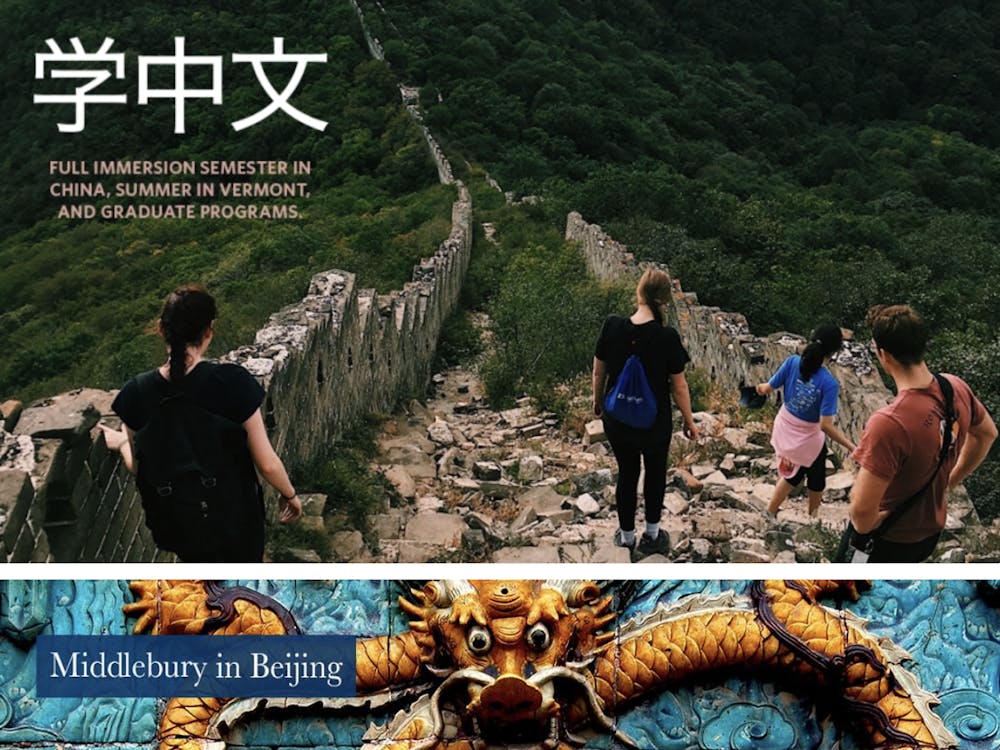Middlebury College has allowed a mistake to face the public and its students since 1966. That mistake is the name of the Chinese department’s language courses: Beginner, Intermediate and Advanced “Chinese.” Out of the nearly three hundred Chinese languages in existence, only Mandarin — the most widely-spoken language in the world and what is used in most of mainland China, Singapore and Taiwan — is taught here. That’s fine; I myself am currently on track to advance to the Intermediate level. But why not call it what it is? I am proposing a change to Middlebury’s current language course titles from “Chinese” to “Mandarin Chinese” or “Modern Standard Chinese.”
First, I must establish my position on the difference between the terms “dialect” and “language.” My father’s whole family speaks Cantonese — the robust, angry-sounding tongue you usually hear in American Chinatowns — as well as some Taishanese, another tongue of Southern China. Neither language says, “Nǐ hǎo.” Many don’t. They are not mutually intelligible with many other Chinese languages. This is practically common knowledge to those at all familiar with the Chinese language sphere.
I will use the term “language” in place of “dialect” in this article. Referring to Chinese languages other than Mandarin as “dialects” can imply that Mandarin is the one from which all other variants deviate while still being somewhat universally comprehensible, which isn’t the case.
Other students agree with me.
“Referring to the so-called ‘Chinese dialects’ as dialects only becomes unproblematic if we also consider Mandarin to be a dialect of Chinese,” said James Chan ’26, who speaks Cantonese and Mandarin.
I believe it is up to the individual’s own interpretation of these linguistic realities when deciding which term to use. However, given these facts, the use of the term “Chinese” to describe a class only instructing Mandarin becomes even more unreasonable.
It is a messy description that does not properly embody the reality of the course. There is also some debate, however, over which term to actually mobilize. My use of “Mandarin” here is due to its being the most colloquially understood label, with another option being Modern Standard Chinese. As for the change of the course title, I believe each choice has its perks, with Mandarin being the more common word and Modern Standard having more technical merit. The college should defer to the opinion of experts and its faculty when making the decision.
Conversely, the use of “Chinese” is sufficient when referring to the written language, since the writing is standardized and generally understandable to any reader — so the word should remain in the name no matter what. My focus is on the spoken element.
This current course title also makes certain promises that are not fulfilled in reality. For example, my father took from the vagueness of the name that a Cantonese course would also be offered, as it is the second most-spoken Chinese language. Middlebury has no such thing.
“If the department really wants to use that term, they should be more inclusive to other dialects, too,” said Kaveh Abu Khaleel ’26, a student from Hong Kong who is a waiter for the Cantonese language table. “[Another student] and I talked for a long time about trying to get a Cantonese J-Term class started. Last year we had Hindi, Swahili, Yiddish, etc., so why not?”
This is not to say that I’m guilt-free. I myself have gotten into the habit of simply saying “Chinese” just because everyone else is doing it. I understand that it is common in everyday speech; however, an elite academic institution like Middlebury upholds a responsibility to maintain correctness, especially considering the political climate around the topic.
As elaborated on in a 2023 Auckland University study by researchers Lin Chen and Danping Wang, the use of Mandarin has been increasingly promoted in China and its surrounding territories since the 1950s, which has contributed to the decline of numerous other languages, such as Shanghainese (Wu), Cantonese, Uyghur, Taishanese, Hokkien, Hakka and many others. Active efforts within the Chinese diaspora are being made to preserve these languages.
Additionally, the U.S. Congressional-Executive Commission on China reported how China has emphasized broadcasting in Mandarin in place of local languages to promote its nation-wide use, as orchestrated by the State Administration of Radio, Film, and Television. This intention was named in its "Notice Regarding Strengthening the Administration of Broadcasting Dubbed Foreign Television Programs,” released in October 2004.
And it’s not as if Middlebury doesn’t know about this situation. On March 7, the Chinese department collaborated with other departments to host “Photographer in a Foreign Land: Kevin Bubriski’s Documentary Projects in Nepal, Tibet and Xinjiang.” At the talk, professional photographer Kevin Bubriski discussed some instances related to the discouragement of the languages of Tibet and Xinjiang in favor of Mandarin. Yet Middlebury is still contributing to the trend in its own way.
There is something to be said about the progression of language in general; the promotion of one language over others is not a new phenomenon, and variations of this situation happen everywhere. But one cannot ignore the political elements of this development. While linguistic uniformity for the sake of stimulating economic cooperation domestically is a reasonable endeavor, this agenda also marginalizes vital aspects of Chinese identity and sometimes quiets those of its surrounding lands. By referring to Mandarin as just “Chinese,” certain prerogatives appear to be supported by Middlebury College regardless of any neutral intention. Not to mention that language shapes identity in many ways; by implying that Chinese language is a monolith, the college also hints that the culture is, too. Perhaps this is not what was intended, but it is the effect.
So I implore Middlebury to choose: Either be open to including other Chinese languages under the program, or change the course titles to “Modern Standard Chinese” or “Mandarin Chinese.” Regardless, the college must amend this discrepancy that has communicated ignorance for nearly sixty years.


